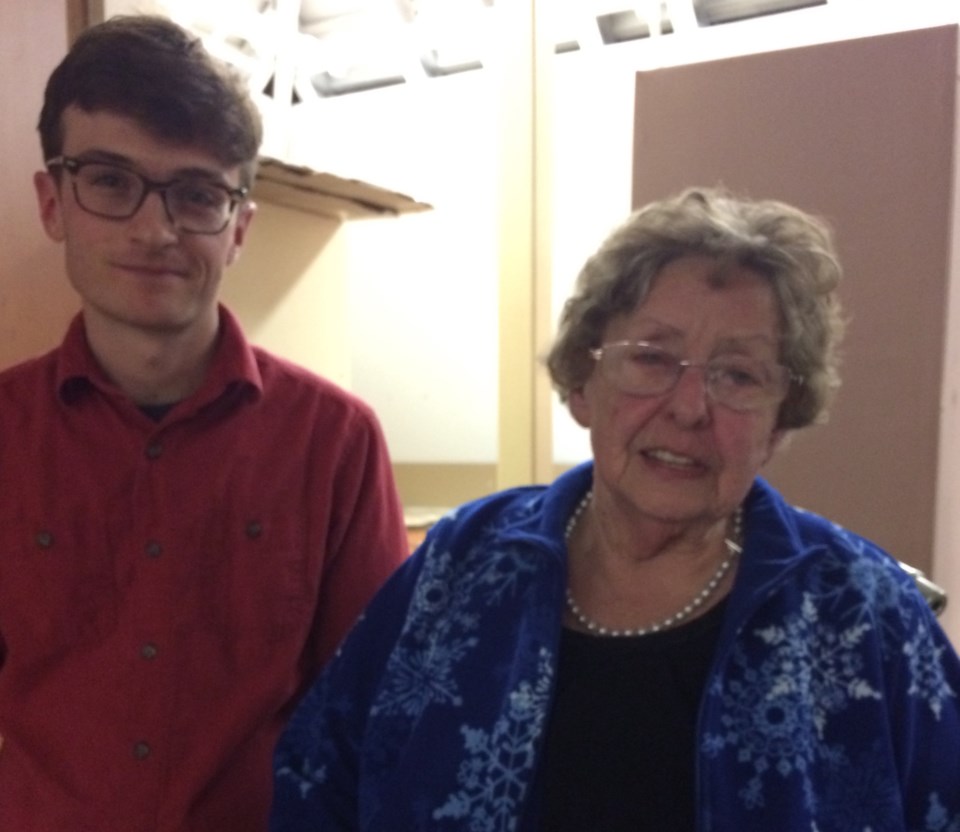NEWS RELEASE
ORILLIA MUSEUM OF ART AND HISTORY
*************************
The recent Orillia Museum of Art and History Speaker night featured Ursula Soper, who told the story of Kathinka Lehmann, a German woman who lived as a pioneer in the Sparrow Lake area in the 1860s.
Ursula Soper was born in 1931 in what became East Germany. She later escaped to the West, where she learned English while working as a housekeeper for a United States Army officer. Soper immigrated to Canada in 1955 and lived and worked in Toronto for several years.
She discovered the story of Kathinka Lehmann when she met Kathinka’s granddaughter, Alberta Doan, through her husband, shortly after she moved to Orillia with her family in 1966. Alberta asked Soper to translate a few of her grandmother’s letters into English.
Then, in the 1980’s, Alberta discovered a trove of additional letters, which she again brought to Soper to be translated, resulting in over 300 pages of translated letters from Kathinka to her family in Germany. These letters are significant as one of only a handful of first-hand accounts by women pioneers in the early years of this area, providing a vivid and detailed portrait of pioneer life in what is now Ontario.
Soper told the story of Kathinka Bruch who grew up in an upper middle-class family in the city of Oldenburg in northwestern Germany. She was cultured and well educated, living in Belgium for two years with her uncle, (who was the royal doctor to King Leopold of Belgium), while studying English and French.
In the fall of 1862, Kathinka was introduced to Adelbert Lehmann, a professional farmer who had immigrated to Canada several years earlier. After a miserable few years spent trying to carve his own farm out of the wilderness at Sparrow Lake, Adelbert returned home to Oldenburg to find a wife. After only two months, Kathinka and Adelbert became engaged. In April 1863 they were married, and the day after the wedding they departed for Adelbert’s farm in Canada.
Life on the Sparrow Lake farm, living in a rustic shanty, must have been an extreme change for Kathinka, who had grown up comfortably in the cities of northern Europe. Kathinka, who previously had no real responsibilities at home, immediately became immersed in work.
Her days quickly became filled with cooking meals for Adelbert’s hired hands and doing their laundry, which she detested, as well as milking the animals and working in the garden. Until a proper frame house was constructed, Kathinka had to do all her cooking outside, in rain or shine.
To add to the hardship, both Kathinka’s mother and brother died of tuberculosis within her first two years in Canada. However, the resulting sorrow was offset by the joyful arrival of five sons.
Eventually, after years of hard work and with occasional gifts of money and an annual crate of presents from Kathinka’s family, the Lehmann family managed to carve a working farm out of the wilderness, raising a number of livestock and a variety of crops.
However, by 1868 Kathinka and Adelbert had begun to realize that their farm would never be very successful due to the rocky soil, and, encouraged by Kathinka’s concern for her sister’s worsening health, the couple rented out their farm and returned to Germany in 1871. Kathinka was devastated by the death of her sister from tuberculosis, before the family was able to return to Germany, and over the next few years her father and one of her own sons also died.
While in Germany she gave birth to her only daughter. With all of her family dead, Kathinka saw little reason to remain in Germany and in 1876 the Lehmanns returned to Canada, this time to the Orillia area, where they settled along Lake Couchiching near what is now Maple Drive and Fittons Road.
Although at first skeptical, Kathinka had found happiness in her life in Canada, and she never left this country again. Three of her sons, Adolph, Karl, and Julius, became successful professionals and moved elsewhere in Canada.
Her remaining son Rudi stayed in the area, where he carried on his father’s profession as a farmer and established a family that still resides in Orillia. The letters translated by Ursula Soper portray a resilient woman who left a legacy in her letters about her life at Sparrow Lake. In sharing Katrinka’s story with us, Soper has allowed us, for a brief time, to immerse ourselves in the pioneer life of one woman.
Join us at OMAH on Wednesday, April 18 to hear Dr. Michael Stevenson speak about Orillia’s Champlain Monument. Tickets to the 2018 Carmichael Art History Lecture featuring Brian Harris with his talk “Canoe Lake and the Mystery of Tom Thomson” go on sale on Monday, April 2 at OMAH.
*************************
